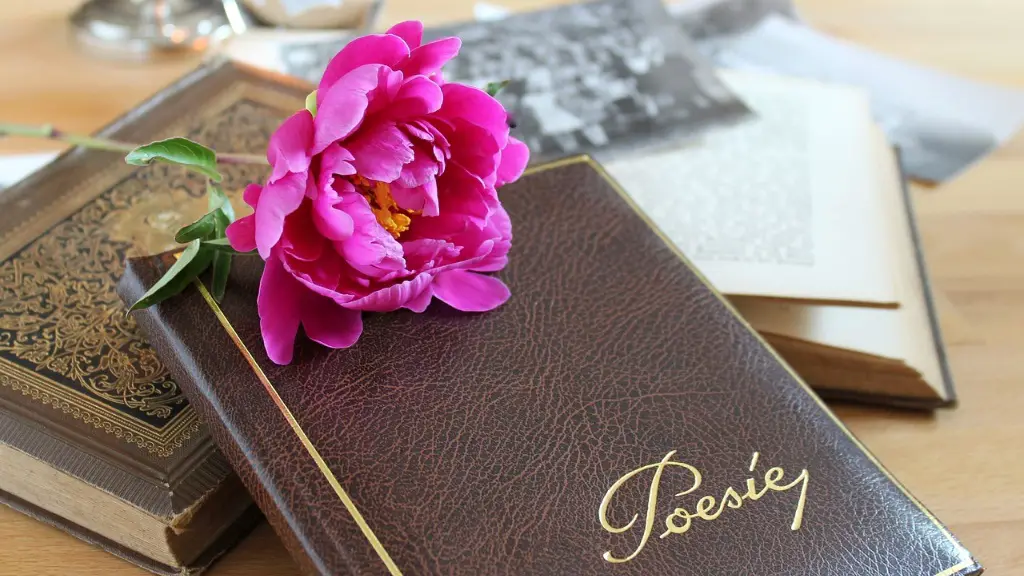What is the Meaning of Poetry in Literature
The meaning of poetry in literature is broadly defined in many ways, with the common thread being a form of creative and emotional expression. Poems often reflect the times and culture in which they were written, serving not only as a work of writing but also as a reflection of the author’s emotional and intellectual state. Poetry has a long and illustrious history and has been and remains an important pillar of literature. Throughout the ages, poets have used the written language to express their thoughts and feelings, reflecting their own situation or that of their society.
Poetry can serve a number of roles in the literary spectrum. Poems can be powerful tools to convey thoughts and feelings, and can often be used to tell stories. They can be used to explore philosophical and social issues, express deep emotions, or as a form of personal therapy. Poems also have the ability to paint pictures with words, allowing authors to describe a place, a moment, or a feeling in vivid detail. This makes it an invaluable tool in storytelling, as it enhances and enriches the stories the author is trying to tell.
Though poetry has been so deeply woven into the foundation of literature, it still remains one of the more difficult forms of writing to master. The structure and thought processes needed to create a piece of literature that flows with poetic grace is a difficult task, and often is a matter of personal style. Authors must be able to weave words together in ways that create a beautiful and vivid scene, and challenge readers to explore the meaning and message behind the words. Even for the more experienced writer, it can be one of the greater challenges in creating works of literature.
The power of the written word has been known since the dawn of time. It has the ability to move people, both in the form of literature and in poetry. It can be seen as a release or an expression of emotion, and through the ages, it has been used to capture and convey points in time. Today, poetry remains a key mechanism in literature and in artistic expression, and works such as those by Langston Hughes, Robert Frost, and T.S. Eliot remain an inspiration for many poets and authors.
The Value of Poetry in Literature
One of the major benefits of including poems in literature is the ability to convey stories and messages in a concise and concise yet emotionally powerful manner. By allowing readers to see a story through the lens of poetry, authors are given the freedom to explore a point in a compelling way. This has the effect of allowing readers to see a story or idea through a different perspective than they may have been accustomed to. It is a powerful tool to tell stories, and can often evoke strong emotions in readers that can be used to heighten the dramatic effect of the piece.
Poetry also allows authors to explore ideas and feelings in ways that traditional prose may not be able to. Poetry allows writers to use powerful imagery to explore the meanings and themes behind the words, creating a deeper understanding of the text and its purpose. This can create a powerful and lasting connection between the author and reader, as readers can often relate to the feelings expressed in the poems in ways that are difficult to achieve in any other form of writing.
Another major benefit of incorporating poetry in literature is its ability to create powerful and memorable moments. By weaving words together in ways that evoke sympathy, longing, or other powerful emotions, authors can create moments that stay with readers long after they have finished the piece. By creating such powerful moments in stories, authors have an easier time conveying their messages in a clear and concise manner that can be appreciated by readers of all levels.
Poetry as a Craft
As a craft, poetry has numerous variations and styles that can be utilized by both readers and writers alike. Different structures, meters, and stylistic choices can be utilized to capture the essence of the piece. It is not uncommon for one poem to be written in several different styles, depending on the meaning or message the author is trying to convey. By being able to express meaning and message through multiple modes of expression, authors can create powerful works of literature that can speak to a variety of audiences.
This also allows authors to explore their craft in more creative and imaginative ways, utilizing words and metaphors to paint a picture in a way that words alone could not. Poetry allows for authors to explore stories and characters on a deeper level, building their own worlds and exploring ideas in ways that would not be possible with traditional prose.
Finally, poetry also offers authors a unique way to make their works more engaging and interactive. By incorporating a variety of imagery and symbolism, readers can connect with the piece in ways that allow them to explore the text and its hidden meanings in ways that can be both stimulating and enjoyable. This type of engagement helps to make the works more memorable, and the exploration of the works can become a personal journey.
Understanding the Words
It is important to note that much of the power of poetry comes from understanding the words used in the piece. By using a variety of words and expressions, authors can create powerful works of literature that invoke emotion and meaning. For example, studies have shown that using words with positive connotations can create a more powerful and memorable effect than simply using words with neutral connotations. This same principle can be applied to the entire poem, as using words that evoke strong feelings helps to build the story and drive the narrative.
In addition to understanding the words used, authors must also be aware of the cadence and flow of the poem. This is important as it helps to create the feeling of the piece, and can be the determining factor in how readers will interpret the poem. By carefully crafting sentences and words, authors can create works that can create powerful effects in the reader and create an emotional experience.
The Uniqueness of Poetry
Perhaps the most unique aspect of poetry is its ability to communicate in multiple ways. As a form of writing, poetry can use various expressions and themes to create powerful pieces of work. The use of different words, structures, and metaphors to convey emotion and meaning can lead to pieces of literature that transcend the written page and can move the reader on an emotional level.
Different forms of poetry often convey different aspects of emotion, letting authors explore the depths of despair, joy, love, anger, frustration, and many other feelings. This makes poetry a powerful tool for authors to explore the complexities of emotions and feelings and how they manifest in stories.
Finally, poetry also offers unique experiences to readers. Unlike traditional prose, a poem readily offers readers a glimpse into the writer’s thoughts and feelings. This allows readers to relate to and understand the authors’ works on a more personal level, creating an experience that can be deeply enjoyed.
The Language of Poems
At the heart of all poetry is the language used, which is often the main point of focus for readers. The words authors choose to use and the way in which they are used to convey meaning can have a powerful effect on how readers interpret the work. By using a variety of language, authors can explore stories and ideas in ways that traditional prose often cannot, and can create works of literature that explore emotions and feelings in a more meaningful way.
When exploring poems, language is key. Authors must be aware of the words they use and how they interact with the story they are telling. This can be done through the use of word choice, cadence, and syntax. By carefully considering each of these aspects, authors can create a unique style that can be both stimulating and memorable.
In addition to language, authors must also consider the dialogue and accents they use in their poetry. This can be done through the use of different dialects, accents, and style of delivery. By carefully crafting his dialogue and accents, authors can further enhance their works, creating works of literature that remain in readers’ memories for a longer period.
The Power of Poetry in Literature
When it comes down to it, the power of poetry in literature lies in its ability to convey powerful messages and emotions. Through the use of language and imagery, authors can explore stories, characters, and ideas in ways that simply cannot be done with traditional prose. This allows readers to connect with the works on a deeper level, giving them experiences that are both stimulating and memorable. It is for this reason that poetry will remain a key part of literature for many years to come.
The Deep Impact of Poetry
The impact of poetry in literature can have a deep and lasting effect on readers and authors alike. Poems can capture moments in time and can explore characters, stories, and emotions in ways that other forms of writing simply cannot. As a form of writing, poetry can bring in readers on a more personal and emotional level, as they can understand and appreciate the works on a more intimate level. This can lead to a longer lasting impression on readers, creating works of literature that become timeless classics.
Poetry also allows authors to explore their own emotions and thoughts in ways that traditional writing may not. By understanding and exploring their feelings, authors can use this to create powerful pieces of literature that express their own views and emotions. Through this exploration, authors can come to a better understanding of themselves, as well as the societies and cultures in which they live.
Finally, poems can also serve to inspire us. They can move us to think differently about our own experiences, explore new ideas and perspectives, and challenge us to look at our own circumstances in a new way. By examining a poem’s themes, readers can often gain insight into their own lives, and by taking these lessons and applying them to their own experiences can lead to a better understanding of themselves and the world around them.
The Transcendent Quality of Poetry
The unique quality of poetry is something that few other forms of literature have been able to achieve. By expressing ideas and emotions in ways that other types of writing may not be able to, authors can create pieces of literature that move us on a deeper level. The ability of poems to capture emotion, convey meaning, and inspire, allows readers to discover new ways of looking at the world and their own experiences in ways that cannot be replicated with other forms of literature.
The importance and power of poetry in literature is something that cannot be understated. By using it, authors can create works of literature that inspire, move, and challenge readers in ways that cannot always be achieved through other forms of writing. It is an invaluable tool and will remain an important aspect of literature for many years to come.





